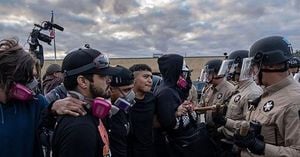In a dramatic turn of events that has sent shockwaves through Kenya and beyond, police in Nairobi have dismantled a sophisticated human trafficking network accused of luring young Kenyans with promises of lucrative jobs in Russia—only to funnel them into the ongoing war in Ukraine. According to BBC and several Kenyan outlets, the operation, which was carried out on the outskirts of Nairobi in the Athi River area on September 27, 2025, resulted in the rescue of twenty-two Kenyan citizens from an apartment where they were "awaiting processing to Russia."
The raid, described by law enforcement as intelligence-led, revealed the dark underbelly of international recruitment scams. Officers seized a trove of recruitment materials, travel documents, and job offer letters, all pointing to a well-oiled machine designed to exploit jobseekers desperate for opportunity. Police arrested one suspect, believed to be the coordinator of travel for the victims, who was promptly remanded for ten days to allow detectives to complete their investigation.
At the heart of this troubling scheme was an unnamed overseas employment agency. Detectives told BBC that the victims had signed contracts committing them to pay up to $18,000 for visas, travel, accommodation, and other logistics—a staggering sum by any measure. Some of the would-be recruits had already handed over deposits of $1,500, convinced that a new life awaited them in Moscow. Instead, they found themselves on the cusp of being sent to the front lines of a foreign conflict.
Kenyan authorities have painted a grim picture of the fate awaiting those ensnared by the trafficking ring. Many recruits, police noted, end up returning home injured or traumatized—if they return at all. In recent weeks, two Kenyans have made it back from Russia, with one currently hospitalized. The specter of loss looms large, as some have simply disappeared, their fates unknown.
One particularly harrowing story has captured public attention: that of a young Kenyan athlete who was captured in Ukraine. According to BBC, he told his captors that he had been tricked into joining the Russian army, a claim that has underscored the vulnerability of those targeted by such schemes. The Kenyan Foreign Ministry has acknowledged it is following up on reports of several nationals trafficked to Russia and now held as prisoners of war in Ukraine.
The problem, it turns out, is not unique to Kenya. BBC reported that citizens from Somalia, Sierra Leone, Togo, Cuba, and Sri Lanka are also currently held in Ukrainian prisoner-of-war camps. Petro Yatsenko, Ukraine’s spokesperson on the treatment of prisoners of war, told BBC that "most African states show little interest in taking their citizens back," highlighting a troubling lack of diplomatic engagement that leaves many stranded far from home.
Amid the growing scandal, the Russian Embassy in Nairobi has moved to distance itself from the affair. On September 28, 2025, the Embassy issued a statement denying reports that a Russian national, Mikhail Lyapin, had been arrested and deported from Kenya in connection with the recruitment of Kenyans to fight in Ukraine. The Embassy clarified that Lyapin was only questioned by Kenya’s Directorate of Criminal Investigations (DCI) on September 25 about his business activities and left the following day "in accordance with his previous plans."
"Diplomats of the Russian Embassy in Nairobi provided the necessary consular and legal assistance to the Russian citizen, and also made sure that his legal rights were not violated," the Embassy stated. They further insisted that they had not received any official information from Kenyan authorities linking Lyapin to recruitment activities, and emphasized that he had never been an employee of Russian government institutions nor attached to the Embassy in Nairobi.
The Embassy’s denial comes as Kenyan authorities continue their investigation into the trafficking syndicate. The suspect arrested in Athi River remains in custody, with police working to uncover the full extent of the network’s operations. The evidence recovered so far—including recruitment materials, travel documents, and job offer letters—strongly suggests that the victims were being processed to join Russian forces in Ukraine, rather than take up legitimate employment in Moscow.
The case has sparked widespread alarm in Kenya and across Africa. Many are questioning how such a scheme could have operated under the radar for so long, and what can be done to protect vulnerable populations from similar exploitation. The fact that some victims had already paid substantial sums in deposits—money that many families could ill afford to lose—has only deepened the sense of outrage.
Authorities have warned that the trafficking of Africans into the conflict in Ukraine may be part of a broader pattern. As BBC noted, the presence of foreign nationals from multiple continents in Ukrainian prisoner-of-war camps points to a global recruitment effort—one that preys on the hopes and desperation of those seeking better lives abroad. The Kenyan government’s pledge to pursue reports of its nationals held as prisoners of war in Ukraine is a step toward accountability, but many observers say much more needs to be done.
Community leaders and activists have called for greater oversight of overseas employment agencies, as well as stronger public awareness campaigns to educate jobseekers about the risks of fraudulent job offers. Some have urged the government to work more closely with international partners to dismantle trafficking networks and provide support for those who have already fallen victim.
Meanwhile, the rescued Kenyans are now receiving assistance as they recover from their ordeal. Police have said that counseling and medical care are being provided, but the road to recovery will likely be long and difficult for many. The scars—both physical and psychological—are a stark reminder of the dangers lurking behind seemingly innocuous opportunities.
For its part, the Russian Embassy’s insistence that it had no involvement in the trafficking scheme and that Lyapin was not connected to recruitment activities is seen by some as an attempt to contain diplomatic fallout. Yet the international spotlight remains firmly fixed on the exploitation of Africans in the Ukraine conflict. As the investigation unfolds, there are growing calls for greater transparency, accountability, and—above all—protection for those most at risk.
The events in Nairobi have laid bare the complex web of deception and desperation that fuels human trafficking across borders. As Kenya grapples with the aftermath, the hope is that lessons learned from this case will lead to stronger safeguards for jobseekers and greater cooperation among nations to combat an urgent and deeply human crisis.




